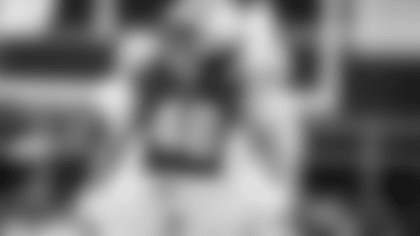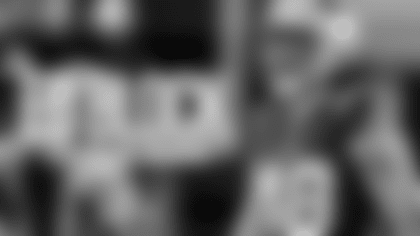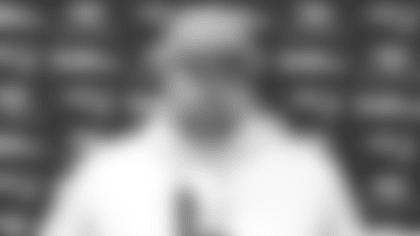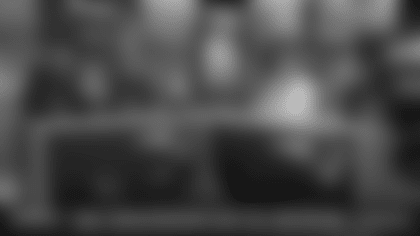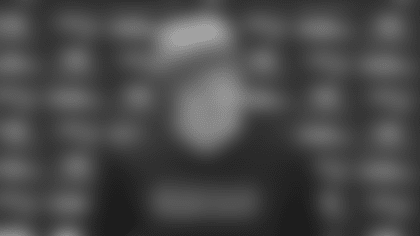Patriots head coach Bill Belichick addresses the media during his press conference at Gillette Stadium on Wednesday, August 4, 2010.
BB: We have one roster move to announce this morning. We released John Wise and signed Eric Ghiaciuc. Eric has got some flexibility. He has played the inside positions. He's been in the league so he's got a little more experience there. We decided to back off practice this morning. It gives us a little time to catch up on film and some meetings and just clean up a few things. I feel like the players are working hard and we've had a lot of contact, and we felt like this was probably the best thing we could do for our team this morning. We'll be back at it this afternoon as we move into the end of the week here. More team work, more group drills, some situational things. We've been doing red area and two-minute and third down, so we'll continue to expand on some of that situational type periods in practice and then by the end of the week we should have a pretty good base on all of those things. Then we can move into next week with our preparations for New Orleans. That's kind of where we're at here.
Q: Can you elaborate on Ghiaciuc - just his background, your connection with him and what kind of player he is?
BB: He's played inside and just has a little more experience than John did, obviously. Although I think John did a good job, we just felt like with the preseason games coming up and where our team is, that he'd have a little more opportunity.
Q: I'm curious on your thoughts at the competition this far at inside linebacker, particularly the new and younger players.
BB: I think all of them have done well. I think Jerod [Mayo] is doing well. Gary [Guyton] got off to a good start, definitely ahead of last year. Eric, also. Tyrone [McKenzie], it's really his first chance and Brandon [Spikes], Thomas Williams, The new guys have been with us a little bit - Dane [Fletcher] - but the new guys have come in and I think they've all done well. A big part of that evaluation will be in the kicking game, as well as on defense. Some of those linebackers are a little more first and second down, some of them are a little more third down. Some of them are probably a little more of the kicking game. Some might have a combination of all three. So I think players have different values and probably different strengths [in] what they can bring to the team. But [they're] all competitive in their respective areas. And then just how it all fits together and how, of course, they perform when we get into the preseason games and continue to evaluate here through these practices. But I think it's a pretty solid unit, good depth and they bring a number of different skills to the position.
Q: You mentioned Dane Fletcher. He's made the move from where he played in college from linebacker to defensive end. Was it a quick transition for him?
BB: Surprisingly quick, yes. It's not like he's running with the first team, so he doesn't get a lot of snaps, but he's a very quick learner and he's an instinctive player. He's got a long way to go, but he's made a lot of improvement and he's done well with his opportunities in the spring and now in training camp.
Q: Can you break down the competition for the spot opposite Ty Warren with Damione Lewis, Gerard Warren and whoever else you have seen there?
BB: I think all the defensive linemen...Normally however many guys you take to the game, they all play and you have plans for them to play. We've been with five. We've been with six. Gerard and Damione are two new guys who really haven't played the techniques that we play in their various systems - Gerard in Cleveland, Denver, Oakland, and Damione in St Louis and Carolina. The things that they did there - a lot of three technique and some one technique with Gerard - are a lot different than what we do. But I think both guys have adjusted to it well. Mike Wright has done well. As we know, he can play nose and end, as can Gerard, as can Damione. Darryl [Richard] has done well for us. The two rookies, Brandon [Deaderick] and Kade [Weston], have both shown up as strong players that are athletic for their size and brought a good level of competition there, too. I think that is a pretty solid group. It's a hard-working group. They're all big and they're all pretty physical players, so we've got pretty good size, pretty good ability to stay on the line of scrimmage. We're going up against some good blockers - [Sebastian] Vollmer and [Matt] Light and those guys, [Mark] LeVoir, [George] Bussey. It's a pretty good run-blocking group. They've been tested there and I think they've been very competitive.
Q: How has Tyrone McKenzie done in camp so far and what kind of unique challenges might he face?
BB: Tyrone was in a similar situation to Brandon Tate. Tyrone missed the whole year. Brandon missed all of training camp and the early part of the season, then was here for a few weeks, then wasn't able to finish the season. Both guys were really starting from just a year of being around here and not really a whole lot of on-the-field time. But I think that both of them have made a good transition and they really are more like veteran players than they are like rookies. Tyrone is a smart kid. He really understands the defense. He's good with the calls and the communication and adjustments and really understands what we're doing. He just needs the practice repetitions of actually doing it, taking on blockers, reading keys. Linebacker is a position that's so much dependent on a player's instincts and his ability to figure out where the ball is going, and runs, and play-action passes, and making those kinds of decisions and quick recognition as soon as the play starts. There's not a way you can prepare for that in the weight room or running laps around the track; you have to be out there with 21 other guys. These practices have been good for him, both in the spring here and in training camp. I think he is moving well. He's active and I'd say, again, he's more like a veteran player than a rookie, but he still has a lot of on-the-field fundamental work to do. Again, [it's] a similar conversation with Brandon Tate.
Q: This is Matt Light's 10th year. Given what a grueling position left tackle is, how impressed are you that he has lasted this long in the league?
BB: Ten years in the league is a long time for any player at any position. That is pretty impressive. But yeah, Matt is, I'd say, a young 10-year veteran. He is still healthy, in good shape. He runs well, changes directions well. He's a good technique player. He's tough. He's really maintained a good, steady, consistent performance level throughout his career. Even as a rookie, he came in and started for us most of the year. He missed a little bit of time when he was injured, but he was a productive player form year one to year 10 and that is pretty impressive. He's played a lot of snaps and he's played them well. He plays against the top pass rushes and most athletic guys on the front usually every week on that side and he's done a good job. To play 10 years in this league, that's impressive no matter what the position in. For skill guys to keep their speed and for big guys to be able to keep their combination of size and athleticism and power with all the contact they take, I'd say it's impressive no matter what position it is.
Q: Light might be smiling a little wider today because the Bills are reportedly going to release Aaron Schobel. Considering the battles those two have had over the years, what are your thoughts on Schobel?
BB: Right now I'm really just focused on our team. I couldn't comment on anybody with anybody else. He is still under contract with Buffalo, so there really isn't anything... I mean, obviously he is a good player and he's given us great competition on the field.
Q: Are you any closer to resolution with Derrick Burgess?
BB: I don't know.
Q: We haven't seen Nick Kaczur on the field recently. Is the signing of Ghiaciuc a sign that we might not see him again?
BB: No, I would say that they are totally unrelated.
Q: Gary Guyton is a guy who has played well for you on the inside and really developed over the last couple years. If you needed to, is he a guy you could move to the outside or do you see him as strictly an inside guy?
BB: Gary is a pretty versatile player. I think he can do a lot of different things. He's smart. He's big. He's athletic. He runs very well. He has had a variety of roles for us on regular defense and our sub defenses. I wouldn't rule it out. But he's done well inside, as you mentioned. He's made a lot of progress over the last two years. I think this camp he started at a higher level than he finished last year. [He had] a good offseason, again, [he has] just more confidence, a better understanding of the defense and offensive play recognition, those kinds of things. I think he's in pretty good shape where he is, but could he play out there? I think he would be competitive out there, yes.
Q: Can you shed some light on Ron Brace's condition?
BB: He's day to day. Hopefully [he'll] be out there as soon as he possibly can. He's working hard to get back and we'd love to have him out there. We'll just take it day to day.
Q: As a coach, can you put a percentage on how likely you think it is that Logan Mankins will be here for the first game?
BB: Right now I am focused on the players that are here and trying to get our team ready for a good practice this afternoon. That's really what I'm thinking about.
Q: Does Brandon Spike's playing style remind you of anyone you have coached or seen over the years?
BB: I'm not really sure exactly what his style is. Our defense is a lot different than what they ran at Florida. Obviously, he's a big, physical player, but I'd like to watch him in our defense a little bit. I think he's got some unique skills. For a tall player, he's got probably more quickness than most guys, probably a little more leverage than a lot of other tall players. He does a lot of things well. It's kind of not by the book but [it's] effective. So I don't know. It will be interesting to see how he... I was just talking to him down there this morning about a couple things that he was doing that are not exactly the way that everybody does them, but he does them effectively and I don't think he needs to change them, but it's just a little bit different. And so how he adapts to certain situations might not be quite the same as, say, Jerod or Gary or somebody else does it, but I think he does it and has done it effectively. It will be interesting to see how some of those things come together. Some may change and become a little more conventional. Some may be a little less conventional, but hopefully equally effective. He's an interesting player to coach.
Q: Are you talking about fundamentally or mentally?
BB: Both. Both. He sees some things that I'm not sure everybody sees. He's kind of got a little bit of his own... He's an instinctive player and he sees things. I don't know if they are exactly the textbook way you would read the plays, but he reads them. It's interesting to kind of work him into our system, really being a 4-3 middle linebacker in the front and system that they played [that was] just different than what we do. And now he's playing more on the guard, being uncovered with the guard as opposed to being covered playing behind a one technique or a defensive guy in front of him. It's just a little bit different, but he does things well. It's a transition, but a good one.
Q: Obviously, you're not lining up your linebackers and having them run a 40-yard dash, but would it be fair to call Gary Guyton the fastest linebacker that is on your roster?
BB: There are probably other linebackers that would probably not be willing to just concede that, so I don't know. We've never put them out there in a race. He runs well. I think there are other guys at the linebacker position that also run well. They probably feel like maybe they are the fastest. I don't know. Speed can be measured in a lot of different ways and for linebackers, there are not a lot of 40-yard dashes like there are for corners and receivers. A lot of it is really more probably 20 yards and a lot of it is five yards. And a lot of it is sideways, not forward. But no doubt about it, Gary runs well. He's certainly one of the fastest linebackers on our team. I think we have other guys that are in that same range. If he's faster then they're close; if they're faster than him, he's close.
Q: When you saw Brandon Spikes in college, you talked about how he does some things unconventionally -
BB: I didn't say that about his college play. I'm just saying in the transition in coming to us...when I watch him play, I mean, he's a good football player. Now that he's in our defense, some things he does are a little bit different than the way we would teach it, but he still does them well. That's what I was trying to say. Maybe I didn't say that
Q: And you won't change it, or you're not inclined to change it?
BB: We'll see how it goes. We'll see how it goes. We've already changed some things. That's part of bringing a new player in and working with him, just like Gerard Warren or Brandon Spikes or pick a player. Guys that have been successful, how much do you want to change it when they've been that successful? But at the same time, maybe there is a better way to do it or maybe in our system, the way they do it just won't mesh. Or maybe it will; it just depends. I don't think there is any right or wrong answer. Five things could be one category and five things could be in another category. It's just part of the whole process and again, those are things you don't see in the spring when you are just going through assignments and trying to get the communication, get everybody to know what to do and be in the right spot and those kinds of things. When you're actually out there in pads and taking people on and reading things at more of a full-speed tempo, you see it a little bit differently.
Q: You were talking about longevity before. You have a number of players on the roster who have quietly made it to their fifth year in the league and some of them have had injury troubles like Rob Ninkovich and Chris Taylor, but have managed to hang around with teams. With a limited number of playing experience or film on these guys, are there things that they are doing off the field that makes you believe they are worth keeping around that long?
BB: Of course. Yes. I mean, for a player to earn his roster spot, however he earns it, he has to do enough to make the organization want to keep him as part of it. There are players that get injured that get released and then there are others that you keep. If you keep a player even though he has an injury situation, you must feel that he has value to your team and your organization either short term or long term if it's more of a developmental-type thing. And vice versa. If you don't, then you find a way to resolve the situation and part ways.
Q: Do you notice any common threads between those players that manage to stick around?
BB: No. I think, again, there is short-term value and there can also be long-term value. Some guys, you think have a chance to develop and need time and they weren't able to show how much they could or couldn't develop because of their injury situation. And there are other players who are maybe a little bit farther along and can contribute and maybe can contribute right away if they were healthy. [I'm] not saying that they are going to be hall of famers, I'm just saying that they can be good contributors on your team once their injury situation resolves and they are healthy. And anywhere in between. I don't know that there's a common thread. I think players could fall into different categories. There's a lot of grey on that and it's obviously very subjective because you are working on limited information.
Q: Has anybody surprised you so far in camp? Anyone one player or position that jumps out?
BB: No, I think this is the kind of point, really, where the evaluation starts. Not that we haven't been evaluating up to this point in camp, but you need to put your team through stress and that's when you get the evaluations the best - when things are tough and they're tired, they're sore, and they've been through a number of practices. Maybe training camp is starting to become a little bit of a grind. Well, it is; it is becoming a grind, but that is necessary. You [can] evaluate somebody in the first day when they're fresh and everything is great and [they] go out there and run around for a few plays, but that's not the NFL season that we're in. We're in a long, grueling, 16-game regular season schedule with intense competition every week [against] great players, great coaches. Very challenging teams we face every single Sunday. A lot of it is staying power and durability and consistency and reliability and terms like that [that] define to good/great players. I think you start to see that in training camp when you get into that, into the dog days of camp and I think we're coming into that. We've been going here for a week or in some cases a little bit longer - two-a-days - and it's starting to wear on them a little bit, but that's good. We need to get to that point and now we'll see how they respond to it, both individually and collectively as a team. Our whole team needs to respond to that, too, not just one individual player. We have to find a way as a total team - players, coaches, everybody - to perform consistently on a regular basis. It's good for evaluations now.




